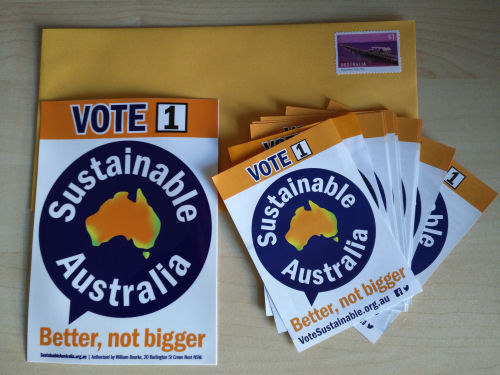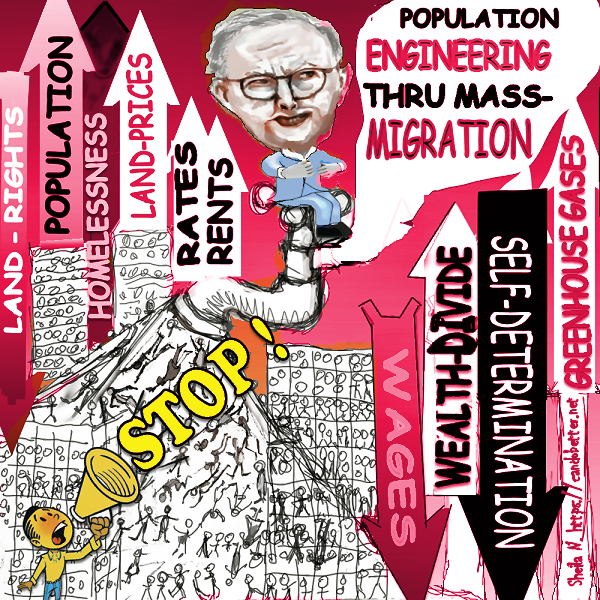population ponzi
Australis Freneticus 2023
Sustainable Australia Party fights the population ponzi
 “The big issues we feel are job security, housing affordability, planning in our suburbs and our environment. And all of those major indicators are going backwards with this onslaught of rapid population growth. So, it’s changing our daily lives. It’s gone beyond some big number into the future. It’s actually hitting us in the face when we drive out of our driveway in the morning and we try and get to work. Or when we try to look up a job when we try to get our next opportunity. Or when we look at our green space in our suburb that’s disappearing. Or looking at our urban heritage… that’s just being bulldozed for this highrise development”. (William Bourke, Sustainable Australia Party, speaking on 3AW to Neil Mitchell)
“The big issues we feel are job security, housing affordability, planning in our suburbs and our environment. And all of those major indicators are going backwards with this onslaught of rapid population growth. So, it’s changing our daily lives. It’s gone beyond some big number into the future. It’s actually hitting us in the face when we drive out of our driveway in the morning and we try and get to work. Or when we try to look up a job when we try to get our next opportunity. Or when we look at our green space in our suburb that’s disappearing. Or looking at our urban heritage… that’s just being bulldozed for this highrise development”. (William Bourke, Sustainable Australia Party, speaking on 3AW to Neil Mitchell)
Census data

William Bourke writes:
The release of the Census data this week shows that Australia’s population expanded by 372,805 people over the year to December 2016 to 24,385,625 people. There is no political mandate for this extreme and unsustainable growth. In the fight for an economically, environmentally and socially sustainable Australia, our party publicly questions this growth. It's a tough job...
Day after day the unholy alliance of big business and the globalist new left send out their propaganda merchants to try to stigmatise anyone questioning Australia's extreme level of immigration-fuelled population growth. But we won't be bullied. We won't cower.
We need a sensible level of immigration. We also know that the silent majority, that lacks the media voice of the abovementioned minority groups, rejects the ideological and greed-driven 'big Australia' agenda.
By the way, what ever happened to the old, real left - that cared about workers' rights and the environment?
Jobs, Housing, Planning, Environment
As a centrist party, Sustainable Australia will continue to fight this extreme growth agenda. We know that unless we do, we can't achieve a sustainable Australia with secure jobs, affordable housing, better planning and a sustainable environment. As part of a broader policy mix, we must return annual permanent immigration - from a record of over 200,000 - back to the long term average of 70,000.
This week I took this message to the media including 3AW's Neil Mitchell.
Macrobusiness published the text of the interview on 3AW and candobetter.net is republishing it here:
Mitchell: “When you look at these [Census] figures, how do you argue it’s changing Australia?”
Bourke: “It’s changing Australian in every way possible. We need to talk about the numbers rather than having racial rants. This is about an Australia being better rather than being ever-bigger. There’s no mandate for this rapid population growth. No party has taken this to an election, so that’s the starting point”.
Mitchell: “How is it changing the country…”?
Bourke: “The big issues we feel are job security, housing affordability, planning in our suburbs and our environment. And all of those major indicators are going backwards with this onslaught of rapid population growth. So, it’s changing our daily lives. It’s gone beyond some big number into the future. It’s actually hitting us in the face when we drive out of our driveway in the morning and we try and get to work. Or when we try to look up a job when we try to get our next opportunity. Or when we look at our green space in our suburb that’s disappearing. Or looking at our urban heritage… that’s just being bulldozed for this highrise development”.
Mitchell: “Do you believe that immigration should be based on race?”
Bourke: “Absolutely not. It’s an issue of numbers. The real issue is that the permanent immigration program to Australia – which is the key driver of our population growth… The key driver of our rapid population growth is our record immigration program of around 200,000 per year. That is triple the long-term average of 70,000 per year. And that’s why places like Victoria are growing by 150,000 people a year rather than its traditional 50,000 per year”
“All we need to do is wind that [immigration] back to what it was 20-years ago to that long-term average – no discrimination based on race or religion or any of those things – just dial it back to the long-term average”…
We won't give up. Join the fight today.
Monthly coffee meet up
We're starting monthly coffee meet ups across Australia, on the first Sunday of the month. Initially this will be in Brisbane and Canberra.
You'll be able to meet like-minded people, join the party (via your mobile phone!) and pick up stickers and flyers. Stay tuned for more locations in coming weeks and months.
Speaking of stickers, we can post you one (or two) for free, with 20 letterbox flyers for your street and/or family and friends. Please simply ask us via the contact us link below. Include your postal address if you're not a member.
New website address
This week we changed our main website address from VoteSustainable.org.au to SustainableAustralia.org.au. There may be a few short-term disruptions, including to website links in recent eNewsletters. [Candobetter.net Editor: Just use a search engine like https://duckduckgo.com to go to these addresses. Candobetter.net has not linked directly to these sites because they do not have SSL certificates - which is really no big deal - except that it makes Chrome and Firefox browsers remove the 'green triangle' from our site if we link directly and some readers then think there is something wrong. Sorry for the boring technicality.]
: Newsletter from William Bourke of Sustainable Australia
Yet again, ABC refuses to discuss population ponzi - by Leith van Onselen
 Unconventional Economist, Leith van Onselen again takes the ABC to task over its shocking bias in reporting and discussing the impacts of Australia's population growth. In this case he exposes the failure of political guests and the moderator on Q&A to respond to the core of an importance audience question about Australia's population ponzi and housing unaffordability. Article first published on Macrobusiness on April 13, 2017 at https://www.macrobusiness.com.au/2017/04/yet-abc-refuses-discuss-population-ponzi/.
Unconventional Economist, Leith van Onselen again takes the ABC to task over its shocking bias in reporting and discussing the impacts of Australia's population growth. In this case he exposes the failure of political guests and the moderator on Q&A to respond to the core of an importance audience question about Australia's population ponzi and housing unaffordability. Article first published on Macrobusiness on April 13, 2017 at https://www.macrobusiness.com.au/2017/04/yet-abc-refuses-discuss-population-ponzi/.
I noted on Tuesday how the ABC has recently displayed shocking bias in the immigration debate.
In late March, ABC’s The Link aired a shockingly biased segment whereby presenter Stan Grant tried to bully Dick Smith on immigration, aggressively dismissing Smith’s arguments and replacing them with a whole bunch of myths and faulty logic in support of a ‘Big Australia’.
ABC Lateline then aired a half-hour segment on housing affordability, which failed to even mention mass immigration’s key role in driving up housing demand and prices in Sydney and Melbourne, despite me cutting a monologue on this exact issue for Lateline, which the ABC left on the cutting room flaw.
Earlier this month, ABC The Drum aired a shockingly biased segment spruiking benefits from immigration without acknowledging the various costs for the incumbent population, including for housing.
And over the weekend, the ABC badly misrepresented comments from former CBA CEO, Ralph Norris, who claimed that Australia’s housing woes were being caused by excessive demand from rapid population growth (immigration).
On Monday night, we got another dose of the ABC’s bias when Q&A refused to acknowledge or discuss the population ponzi following a reader’s question. Below is the transcript (video at 14.29):
Housing Ponzi:
QUESTION
A reversal of the two-speed economy now sees residential construction in the eastern states driving the nation’s prosperity. But some have likened the current housing boom in Sydney and Melbourne to a population Ponzi scheme, and housing affordability is a major problem. How long does the panel think that housing and population growth can continue to make up for mining and manufacturing? And is it time for a rethink of the generous tax concessions offered by negative gearing?TONY JONES
I’ll start with Penny Wong, because that is a specific policy of the Labor Party.PENNY WONG
Well, I mean, we have a view, and I think, you know, a fair few people have backed it in, frankly, that you don’t have a serious housing affordability policy unless you tackle negative gearing and capital gains tax. We have some of the most generous tax incentives in the world for investors. We have a very small proportion of new owners…of housing being bought by first-home buyers. We’ve got very large numbers of proportion of investors in the market. Something’s got to give, and if we don’t tackle the tax incentives, which really don’t level… which skew the playing field towards investors, then you really don’t have a housing affordability policy. And the extraordinary thing is that we saw the Treasurer today giving a speech on housing affordability where the single biggest area which he needs to address was off the table for political reasons, not for policy reasons.TONY JONES
You mean negative gearing?PENNY WONG
Negative gearing, yes. Because they want to be able to belt us about it rather than actually have a sensible discussion about the policy.TONY JONES
Just a very brief one. The Australian ran up the flag pole the idea that Morrison, the Treasurer, would talk in that speech about the idea of super funds for first-home buyers being able to be raided to pay for housing, or at least to give a deposit.PENNY WONG
Well, this is the idea that Malcolm Turnbull himself has described as a thoroughly bad idea, and I agree with him, because if you’re saying to people, “Raid your retirement savings,” which is what it is, to purchase a house, it seems to me pretty bad economic policy.TONY JONES
OK. Mitch Fifield?MITCH FIFIELD
Thanks, Tony. Thanks, David. Negative gearing, ultimately, is a way of getting a tax deduction for an expense incurred in earning income. That’s what negative gearing is.TONY JONES
If you already own a house, to be precise.MITCH FIFIELD
Yeah, but that is…that’s part of our system of taxation. What we have great difficulty with is Labor presenting negative gearing as though it somehow magically solves the housing shortage and housing affordability. It wouldn’t. It’s something that people have made investment decisions based upon, so you don’t want to go changing these things lightly. Overwhelmingly, the single greatest contributor to the housing affordability issue is land supply, is a lack of land in the right places, is zoning restrictions that make it difficult to develop, is red tape that makes it difficult for housing estates. And also, importantly, having infrastructure, like transport in the right places. That’s… Those things together probably make the greatest contribution.TONY JONES
Mitch, I’ll come back to you. I will come back to you.MITCH FIFIELD
One point….TONY JONES
I will come back to you, but make your quick point.MITCH FIFIELD
Just a quick point. Ultimately, this is a shared endeavour between federal, state and local governments, which is why the Treasurer has indicated that, in the Budget, we will have measures where the Commonwealth can make a contribution to doing something about this issue.PENNY WONG
Two very quick points. One, Mitch talks about retrospectivity. Our policy was no retrospectivity, so existing assets would be continued to be treated the same. What we wanted to do was restrict negative gearing to new housing to try and pull on supply. But the second point, the Government never answers – why should somebody buying their seventh house have a better…have more tax incentives than someone buying their first?(APPLAUSE)
TONY JONES
I’ll let you respond to this question, you obviously want to, and then I’ll go to…NIKKI GEMMELL
I just feel like this is one of the great political tragedies, housing affordability, of this generation. As a mother of four kids, I just despair that my children will ever be able to live in the same city as me. But then what I’m also noticing around me, in terms of my peers in their 40s, 50s, 60s, there a lot of people around me who are still renting, who have never been able to make that leap into the great Australian dream of owning their own plot or block, whatever it is. And I just think that’s so sad. We’re facing worlds of retrenchment, of jobs that aren’t secure anymore, of situations where pension funds… You know, we don’t have the super to pay into our pension funds. I just feel like this is a huge ticking time bomb and we don’t only need to talk about the younger generation, it’s the older generation as well, heading into their pension years and still renting.TONY JONES
I’ll come to you, I will, I just want to… The Great Britain has had a similar experience.NIKKI GEMMELL
The Great Britain.BILLY BRAGG
Yeah. We do, we do have.TONY JONES
The Great Britain, or Great Britain. I mean, the massive price inflation of housing in London has forced a huge number of people out of the city.BILLY BRAGG
It’s right across the country, really. I think the average house price now is over eight times more than the median disposable income for the average family, average median income. And this has had a considerable knock-on effect. One of the reasons why is because people who no longer can make any money on savings, or rely on a pension, are buying houses to rent to people. I don’t know if they’re the second homes you’re talking about. Are they being bought to rent out or are they being bought to live in?TONY JONES
Mostly by investors to rent.BILLY BRAGG
Yeah. We call it buy-to-rent. It’s the same sort of thing. And obviously, as a renter, you do get certain tax breaks and the people that you’re…renting the houses out don’t have a great deal of protection. This has become a very big issue. And as you said, we also have the situation where many of our key workers – our teachers, our firefighters, our nurses – are having to live outside of the cities where they’re working. It’s a considerable problem. 50% of the land that gets permission to be built on isn’t built on. The amount of affordable housing that’s built on there is dwindling all the time because of the huge profits to be made in selling up-market houses. It’s a real situation. We should be building more houses. And at the moment, the local councils are not allowed to build houses. Now the Government wants housing associations – and they’re the people that replaced the councils for building affordable housing – they’re going to compel housing associations to sell their houses on the free market. It’s ridiculous.TONY JONES
OK, Mitch Fifield, should this not be treated as a national emergency, and would you not get credit if you did that? A government often said to have little vision, a government going down in the polls, could actually make a huge…well, impact, by doing something like that, but it never happens.MITCH FIFIELD
Well, to the contrary, the Treasurer and the Prime Minister have indicated that housing affordability is high priority for the Government. That’s why we’re going to have a plan in the Budget. And we’ve got to look at all elements because housing availability isn’t just about home ownership, it’s about rental affordability, it’s about social housing, it’s about homelessness. You need to have a comprehensive package that addresses all of those elements, but you also need the cooperation of the state governments and local governments. As I said before, it’s a shared endeavour of all levels of government, and it’s something that we’re going to have a lot more to say about in the Budget.TONY JONES
OK, it’s time to move along.
As you can see, not one panelist even mentioned the central part of the question pertaining to Melbourne and Sydney housing being a “population Ponzi scheme”, nor whether it is sustainable. Nor did Tony Jones do his usual thing and bring guests back onto the key point of the question.
Hopelessly biased ABC.
The Turnbull’s population credibility collapses under Dick Smith barrage
 Article by Leith van Onselen. Dick Smith is a national treasure. Yesterday he used his own money to fund an ad in Australia’s major newspapers challenging Lucy Turnbull – the chief commissioner of the Greater Sydney Commission (GSC) – on mass immigration, and asking her what her eventual plans are for the population of Sydney – querying whether it could be 16 or even 100 million.
Article by Leith van Onselen. Dick Smith is a national treasure. Yesterday he used his own money to fund an ad in Australia’s major newspapers challenging Lucy Turnbull – the chief commissioner of the Greater Sydney Commission (GSC) – on mass immigration, and asking her what her eventual plans are for the population of Sydney – querying whether it could be 16 or even 100 million.
Below is the ad:


The response from Lucy Turnbull’s office was pathetic. From The Australian:
The Australian sought comment from Ms Turnbull, through the Greater Sydney Commission. Commission chief executive Sarah Hill responded that Sydney’s rate of population growth was the “hallmark of all successful cities around the world”, and the group based its planning on a middle range of growth forecast, prepared by the state’s demographers.
“More than half of this growth is through natural increase,” Ms Hill said. “Our responsibility is to plan for this to make our city more liveable, sustainable and productive, rather than to debate the facts.”
So, “more than half of this growth is from natural increase”, according to the GSC? Not according to the Australian Bureau of Statistics (ABS). As shown in the below charts, net overseas migration (NOM) into NSW (read Sydney) accounted for 67% of population growth in financial year 2016, and has done so on average over the past 30-plus years:


However, the above charts significantly understate the true impacts of immigration on Sydney’s population growth because “natural increase” captures the children of migrants. That is, NOM brings with it an immediate direct boost to population as well as a subsequent boost as new migrant arrivals have children (subsequently classified as “natural increase”).
For this reason, the Productivity Commission this year estimated that Australia’s population would peak at 27 million by 2060 under zero NOM, versus 41 million under NOM of 200,000 – a difference in population of 14 million! This comes despite only 9 million of this population increase coming directly from NOM. The other 5 million comes from migrants and the decedents of migrants having children (see next chart).

These are “the facts”, which the GSC seems only too willing to ignore: it is primarily mass immigration that is causing Sydney’s infrastructure woes, as well as pressuring housing.
Clearly, the best way for Lucy Turnbull to make Sydney “more livable” is to tap her husband on the shoulder and convince him to rein-in Australia’s mass immigration program.
Because as far as high immigration goes, the buck stops with the federal government. If you are in local or state government then you don’t have much choice but to cope with continuing mass immigration putting an ever-increasing strain on already stretched infrastructure, housing and public services.
Lucy Turnbull is in a unique position to influence federal policy and effect change for the betterment of both Sydney and Australia. But like her husband she is a mouthpiece for the ‘growth lobby’ that gains from never-ending population expansion at the expense of the rest of us.
This article, by Leith van Onselen, was first published at http://www.macrobusiness.com.au/2016/12/the-turnbulls-population-credibility-collapses-under-dick-smith-barrage/. Republished with author's permission.



Recent comments